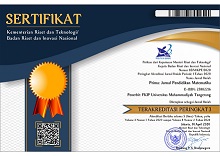ANALYSIS OF MATHEMATICS LEARNING MOTIVATION FOR JUNIOR HIGH SCHOOL GRADE 7 IN THE IMPLEMENTATION OF THE KURIKULUM MERDEKA
Abstract
Learning motivation is one of the crucial factors that influence students' success in understanding subject matter, including mathematics which is often considered challenging. This study aims to examine the level of student motivation in learning mathematics in the implementation of the Independent Curriculum, identify various factors that influence learning motivation, and evaluate the effectiveness of the Independent Curriculum itself. Using a qualitative descriptive approach through interview and observation methods, this study found that most students showed learning motivation at a moderate level, while only a few were at a high or low level of motivation. Various factors that influence learning motivation consist of internal and external factors. The implementation of the Independent Curriculum is considered to provide flexibility for students with high motivation, but has not fully supported students with low motivation due to limited teacher training and learning resources. The conclusion of this study is that the Independent Curriculum has a great opportunity to increase student learning motivation if supported by the implementation of personal learning strategies, increasing teacher competence, and utilizing innovative learning technology.
Keywords
Full Text:
PDFReferences
Arikunto, S. (2010). Prosedur Penelitian: Suatu Pendekatan Praktik (Revisi VI). Rineka Cipta.
Asrifan, et al. (2023). Pengaruh Kurikulum Merdeka terhadap Pembelajaran Berbasis Proyek. Jurnal Pendidikan Nasional, 5(2), 123–135.
Azizah, S., & Firmansyah, A. (2020). Tantangan Pembelajaran Matematika di Kurikulum Merdeka. In Jurnal Matematika dan Pendidikan (Vol. 4, Nomor 3).
Bahriah, E. S., Nurfikri, M., Ayunda, M. R., & Raihan, H. M. (2022). Analisis Motivasi Belajar Kimia Siswa di Sekolah Madrasah Aliyah Pasca Pandemi COVID-19. Prosiding Seminar Nasional Pendidikan Kimia, 1(1), 206–215.
Damayanti, E., Sugiatno, S., & Sayu, S. (2018). Kelancaran Prosedural Matematis Siswa dalam Menyelesaikan Soal Operasi Bentuk Aljabar di Sekolah Menengah Pertama. Jurnal Pendidikan dan Pembelajaran Khatulistiwa (JPPK), 7(9).
Dweck, C. S. (2017). Mindset: The New Psychology of Success. Random House.
Farhatunnisah. (2019). Pengaruh Motivasi Belajar dan Disiplin Belajar terhadap Prestasi Belajar Siswa pada Mata Pelajaran Matematika Kelas VII di MTs Ittihadil Ummah Karang Anyar Mataram Tahun Pelajaran 2018/2019. Doctoral dissertation, UIN Mataram.
Frandsen, M. (2015). Intrinsic and Extrinsic Motivation in Learning Mathematics. Educational Studies Journal, 8(2), 112–123.
Ismail, H. (2018). Peningkatan Motivasi Belajar Matematika melalui Pembelajaran Berbasis Masalah pada Siswa Kelas V SD Inpres Palupi. Jurnal Kreatif Online, 4(4).
Kemendikbudristek. (2022). Kurikulum Merdeka: Transformasi Pendidikan Indonesia. Laporan Kemendikbudristek, 1–50.
Moleong, L. J. (2017). Metodologi Penelitian Kualitatif. PT Remaja Rosdakarya.
Murtiyasa, B., & Amini, A. D. (2021). Analisis Motivasi Belajar Siswa SMP dalam Pembelajaran Matematika di Era COVID-19. AKSIOMA: Jurnal Program Studi Pendidikan Matematika, 10(3), 3711. http://dx.doi.org/10.24127/ajpm.v10i3.3711
Nurrawi, A. E. P., Zahra, A. T., Aulia, D., Greis, G., & Mubarok, S. (2023). Motivasi Belajar Siswa terhadap Hasil Belajar Matematika. Plusminus: Jurnal Pendidikan Matematika, 3(1), 29–38. https://journal.institutpendidikan.ac.id/index.php/plusminus/article/download/1220/1039/2634
Oktaviani, R., & Dewi, D. P. (2020). Analisis Motivasi Belajar Siswa SMPN 8 Cimahi Menggunakan Media Visual Basic for Application Berbasis Microsoft Excel pada Materi Pecahan. Juring (Journal for Research in Mathematics Learning), 3(2), 133–140.
Ruseffendi, E. T. (2010). Dasar-dasar Matematika untuk Guru. Penerbit Tarsito.
Sardiman, A. M. (2018). Interaksi dan Motivasi Belajar Mengajar. PT Raja Grafindo Persada.
Schunk, D. H. (2014). Motivation in Education: Theory, Research, and Applications. Pearson.
Sugiyono. (2016). Metode Penelitian Kuantitatif, Kualitatif, dan R&D. Alfabeta.
Sugiyono. (2018). Metode Penelitian Kuantitatif, Kualitatif, dan R&D. Alfabeta.
Tambunan, H. (2015). Dasar-dasar Motivasi dalam Pembelajaran. Penerbit Andi.
Tasaik, H. L., & Tuasikal, P. (2018). Peran Guru dalam Meningkatkan Kemandirian Belajar Peserta Didik Kelas V SD Inpres Samberpasi. Metodik Didaktik: Jurnal Pendidikan ke-SD-an, 14(1), 45–55. https://doi.org/10.17509/Md.V14i1.11384
Tigowati, Efendi, A., & Budiyanto, C. W. (2017). E-Learning Berbasis Schoology dan Edmodo: Ditinjau dari Motivasi dan Hasil Belajar Siswa SMK. Elinvo (Electronics, Informatics, and Vocational Education), 2(1), 49–58. https://doi.org/10.21831/elinvo.v2i1.16416
Uno, H. B. (2016). Teori Motivasi dan Pengukurannya. Bumi Aksara.
Vandini, I. (2015). Peran Kepercayaan Diri terhadap Prestasi Belajar Matematika Siswa. Jurnal Formatif, 5(3), 210–219. https://doi.org/10.30998/formatif.v5i3.646
Wahab, A. (2016). Efektivitas Pembelajaran di Sekolah. Penerbit Graha Ilmu.
DOI: http://dx.doi.org/10.31000/prima.v9i2.13898
Article Metrics
Abstract - 946 PDF - 258Refbacks
- There are currently no refbacks.
Prima: Jurnal Pendidikan Matematika
Program Studi Pendidikan Matematika
Fakultas Keguruan dan Ilmu Pendidikan
Universitas Muhammadiyah Tangerang
Jl. Perintis Kemerdekaan I/33, Cikokol
Kota Tangerang, Indonesia
e-mail: primajpm@gmail.com
Prima: Jurnal Pendidikan Matematika (p-ISSN: 2579-9827 | e-ISSN: 2580-2216) is licensed under a Creative Commons Attribution 4.0 International License.







